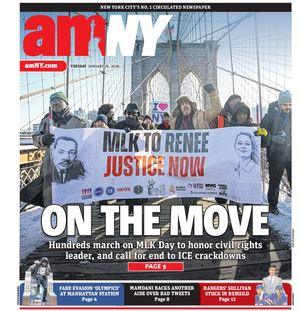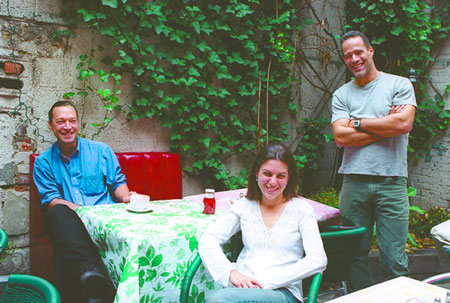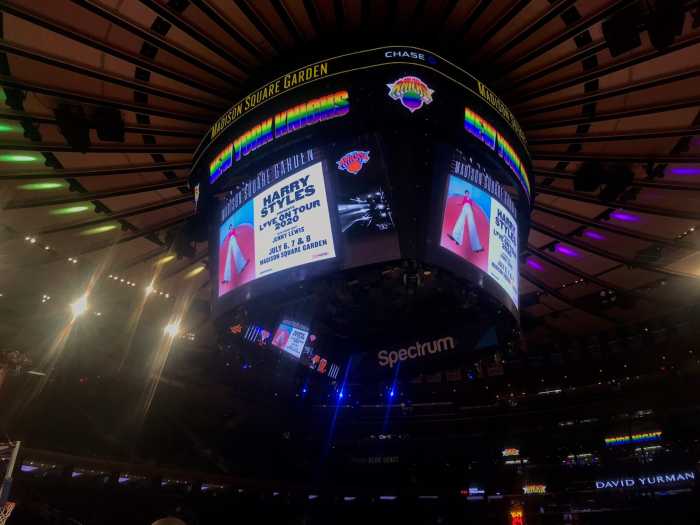By Timothy Lavin
Former war correspondents open bar and encourage lively debate
Many young, intelligent people have devoted otherwise productive hours imagining the perfect bar that they would one day own with their friends. The Half King, now a thriving haunt on 10th Avenue and 23rd Street, began inauspiciously as one of those classic bar room conversations. Good friends were carousing and conceiving the establishment they’d own one day, where other friends could drink for free and pensive writers could brood alone or argue pertinently.
Yet unlike nearly every other conversation of its ilk, this one came to fruition, even far exceeding the expectations of its raconteurs, Scott Anderson and Sebastian Junger.
Though the two spent much of their youth working odd jobs and waiting tables, they are now both accomplished writers. Anderson is a novelist and writes for the New York Times Sunday magazine while Junger is a staff writer at Vanity Fair and is best known for writing “The Perfect Storm,” a bestseller that eventually became a Hollywood success. Both are also experienced war correspondents.
They conceived of the Half King as a writer’s bar, one that would feature regular readings, photojournalism exhibits and animated discussions without intellectual pretense. With the help of Jerome O’Connor, a film producer and veteran New York City bar owner, and Nanette Burstein, a documentary filmmaker, the two took their admittedly vague plans and created something unique.
“The original idea,” said Anderson, “was to get a place in Red Hook, like a four-story building. We’d live on the upper floors and run a bar on the ground floor that would pay the rent.” Burstein, then Anderson’s girlfriend, now his wife, had little initial enthusiasm for that plan. O’Connor liked the bar concept but considered their strategy unwise.
“Jerome overheard us and said, ‘That’s a nightmare. A disaster,’” said Anderson. “Then he sort of took over and masterminded it from there. He had the instincts.”
O’Connor selected the unlikely address on the far west side of town and personally oversaw the construction. The resulting bar and restaurant — named after a Seneca chief who deftly manipulated British and French colonialists on his land — opened in July of 2000 with a full house of journalists, editors and literary agents.
“It really was a hit almost immediately and it kind of stayed that way,” said Anderson.
In part, the bar owed its initial success to propitious timing: its opening coincided with the release of the film version of “The Perfect Storm,” which quickly became a blockbuster. Junger capitalized on the attention the film received by giving a well-received reading and discussion of the book at his new bar. Months later, in the aftermath of 9/11, the Half King was a gathering place for the legions of firefighters and construction workers who found it a convenient rest stop on their way home from Ground Zero on the West Side Highway.
The owners invited writers to read their work sporadically for the first two years, and then hired Ellen Ryder, who runs a public relations firm for authors and publishers, to regularize the schedule and continue bringing in serious, contemporary authors.
“I follow a few big themes,” Ryder said. “Timeliness, international perspective and investigative reporting — we try to focus on those. Things that are in keeping with the kind of work the owners themselves do.”
Burstein’s credits as a filmmaker include “The Kid Stays in the Picture” and the Academy Award-nominated “On the Ropes.” Both Junger and Anderson have earned considerable reportorial resumes abroad. Junger began his journalistic career as a freelancer in Bosnia in 1993 and Anderson has covered close to a dozen war zones, often along with his brother, the New Yorker’s Jon Lee Anderson.
The experiences left both writers with an internationalist sensibility and a predilection for serious discussion, characteristics clearly reflected in their bar’s atmosphere.
“They didn’t want it to be seen as this ponderous, pompous literary hang out,” said Ryder. “They really wanted it to be lively, a place where conversations can happen, where people can talk about ideas and books and meet other writers and aspiring writers.”
Although they leave the author booking to Ryder, their preferences are explicit, said Junger.
“We wanted no profiles, no entertainment, no sort of extreme sports. Just serious journalism,” he said. One time, Ryder said she made the mistake of booking a poet.
“They made it clear: this was not the type of reading they had in mind.”
Sitting at the bar on a recent Sunday morning, Anderson considered the reading series, and the tone they hoped to create.
“It’s not a bad thing, given the current political climate, to be controversial, to spark debate,” he said. “We don’t have any particular political angle that I think we push, just something that’s interesting, that gets people thinking. I think it would be fascinating if someone came in and said, ‘Hey, I think the occupation of Iraq is going great.’ A journalist saying that would really turn heads.”
Infusing a bar — usually a refuge from life’s solemnities — with gravity and politics, however, can be a struggle.
“We get our best crowds for something controversial, politically oriented. Sometimes you can’t get in the door,” said Anderson.
But, at the same time, balancing controversy with the pragmatics of running a business requires some dexterity.
“There’s limits,” he said. “In a restaurant there’s a limit to what kind of war photos you can put up, for instance. You don’t want to censor, but you don’t want pictures of some guy with his arms hacked off.”
The success of the reading series, held on Monday nights, has fluctuated, though their mailing list now numbers 3,500. When Junger spoke in September about his recent Vanity Fair article, “Liberia’s Savage Harvest,” it drew a huge crowd. He and photographer Tuen Voeten gave a presentation about Liberia’s child soldiers that ignited an animated question and answer session.
More recently, when novelist Stanley Bing discussed his latest novel, “You Look Good Today,” in February, the night could not be considered an overwhelming success. The crowd was sparse and questions were few.
But Bing’s subject matter was deadly serious. His novel details the emotional deterioration, and eventual demise, of a corporate executive. The idea originated while Bing served on a jury hearing a sexual harassment case, he said. The experience moved him profoundly.
“I felt the depth of human frailty and madness as never before,” he said. “I felt I had to write about it.”
The audience, a pensive one considering the rampantly flowing Guinness in the adjacent room, listened raptly as he read, his shadow moving expressively on the fashionably bare brick wall behind him.
The rest of the Half King’s décor is similarly understated, but undoubtedly of unique origin. Broad planking oak, made from the ruins of a collapsed Mennonite barn in Pennsylvania, forms much of the flooring and tables. In the dining room currently hangs a photo exhibit by Esther Levine documenting the transformation of modern Berlin. The windows adorning the wall that separates the bar from the dining room come from an old Harlem church. Burstein salvaged them from a warehouse.
O’Connor tackled most of the design and construction, although Anderson likes to tell a story describing his minimal input. He traveled to Panama several years ago on assignment for the Times magazine to investigate an island that served as a free-range penal colony. Rival prison gangs would roam the grounds at night and attack each other with homemade shivs, while the guards locked themselves in for the evening.
When he toured the prison camps during the day, one guard presented him with a box of confiscated contraband and told Anderson to take his pick. As he told this story, Anderson pointed with a mix of pride and good humor to a rustic-looking weapon that adorned the otherwise empty space above his bartender’s head: the knife he had selected — long, black, and clearly sinister in design — now hangs there, contrasting nicely with the soft red of the bar’s walls.
“I think that was my lone contribution to the décor,” he said.
Indeed, now that the bar is running successfully, the owners have little to do with its daily operation.
“One of the goals is to see how much you can get other people to do,” said Anderson. But even that can be a daunting responsibility for someone whose restaurant experience was limited to being a waiter not an owner.
“The time that it really struck home was the year before we opened. I came to the building and watched these 25 workmen putting the place together. Twenty-five people working in the service of this idea I had.”
The success of the project is still something of a shock to its architects.
“We initially had very low expectations. We were just hoping to get our money back,” said Junger. “This is way beyond what we had hoped.”
When traveling in Tripoli recently, Anderson ran into a fellow journalist who had been to the Half King and was raving about it, unaware of its ownership. “So I guess we’re now on the bar circuit for international photojournalists,” Anderson mused. “I think that’s really cool. Our crazy idea kind of worked.”
The Half King’s regular Monday evening reading series is free and open to the public. Appearing Monday, March 29 at 7, will be New York Times Reporter Randy Kennedy. The Half King is located at 505 West 23rd Street (at 10th Avenue) one block east of Chelsea Piers. For information: 212-462-4300 or www.TheHalfKing.com
Reader Services



































